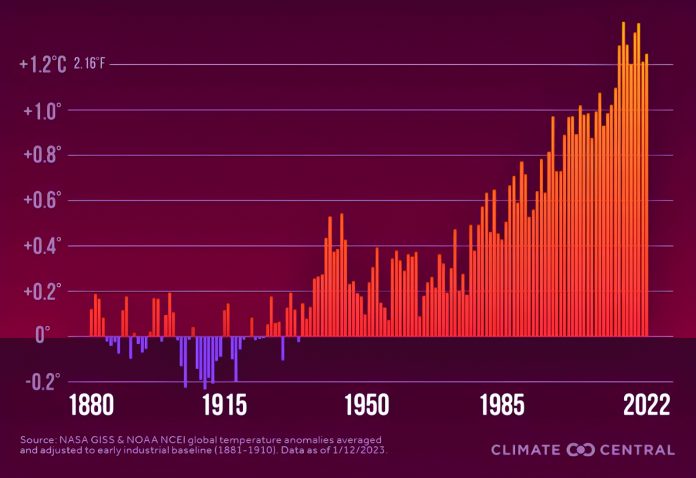Wajeeha Najam
Climate change is one of the most pressing challenges facing humanity today, with far-reaching implications for ecosystems, economies, and societies. The scientific community has reached a consensus that climate change is driven primarily by human activities, particularly the emission of greenhouse gases (GHGs). As governments and institutions worldwide strive to tackle this crisis, the effectiveness of climate policies and their practical implications remain subjects of intense debate.
The Earth is experiencing unprecedented warming, with global temperatures rising faster than anticipated. According to NASA, the average global temperature in 2023 was 1.2 degrees Celsius higher than the average between 1951 and 1980. The consequences are already visible in the form of shrinking Arctic and Antarctic ice, more frequent heatwaves, and extreme weather events. The challenge now lies in limiting temperature rise to below 1.5 degrees Celsius by 2100, a target set by the 2015 Paris Agreement.
Despite numerous global efforts, greenhouse gas emissions continue to rise, reaching a record 57.4 gigatons in 2022. Many industrialized nations, including Germany, the United Kingdom, the United States, Japan, and Norway, have made progress in reducing emissions, with Germany achieving a 40% reduction compared to 1990 levels, and the United Kingdom reducing emissions by nearly 50% within the same period. The United States has also managed a 3% reduction since its peak in 2007. However, developing countries face difficulties due to economic constraints and dependence on fossil fuels. Financial assistance to help these countries transition to cleaner energy remains insufficient; estimates suggest they will require around $1.8 trillion annually by 2030 to meet climate targets.
International agreements such as the Kyoto Protocol and the Paris Agreement have played crucial roles in setting climate action goals. However, the effectiveness of these agreements often falls short due to several shortcomings, including the lack of stringent enforcement mechanisms, insufficient financial commitments from developed nations, and the absence of legally binding targets for emission reductions. The recent UN Climate Conference (COP29), held in Baku, Azerbaijan, aimed to address these shortcomings by focusing on enhancing climate finance, strengthening adaptation measures, and ensuring that commitments made by countries are more transparent and enforceable.
Key outcomes of COP29 included increased pledges for climate adaptation funding, a renewed commitment to reducing fossil fuel subsidies, and stronger measures to monitor and report emissions reductions. The mobilization of climate financing and technology transfer from developed to developing nations remains a critical aspect that requires urgent attention.
The European Union’s Green Deal aims to achieve climate neutrality by 2050. It includes ambitious targets such as a 55% reduction in emissions by 2030 and significant investments in renewable energy and sustainability. However, critics argue that the Green Deal places excessive financial burdens on industries and consumers while making the EU economically vulnerable to external dependencies, such as China’s dominance in rare earth materials essential for renewable technologies. Additionally, the transition may strain traditional energy sectors, leading to potential job losses and economic disruptions.
One of the most promising aspects of climate action is the rapid advancement of clean energy technologies. Solar and wind energy have become more affordable and efficient, with costs declining significantly over the past decade. Countries like China have made substantial progress in deploying renewable energy, aiming to achieve their net-zero goals ahead of schedule. Innovations in battery storage, hydrogen fuel, and carbon capture technologies offer hope for a sustainable energy transition.
Pakistan has also committed to addressing greenhouse gas emissions through various initiatives and policies. The country has pledged to reduce its emissions by 20% by 2030 under its Nationally Determined Contributions (NDCs) as part of the Paris Agreement. Pakistan’s policies focus on enhancing renewable energy capacity, with ambitious targets to increase the share of clean energy in its energy mix to 60% by 2030. The government has launched multiple projects in solar, wind, and hydropower sectors, including the Quaid-i-Azam Solar Park, Jhimpir Wind Corridor, and Neelum-Jhelum Hydropower Project. Additionally, afforestation efforts under initiatives such as the Ten Billion Tree Tsunami project aim to offset carbon emissions. However, Pakistan faces significant financial and technological challenges in achieving its climate goals, necessitating increased international support and investment.
To effectively combat climate change, governments and stakeholders must adopt a multifaceted approach. Enhanced international cooperation with stronger enforcement of climate agreements and transparent reporting mechanisms is necessary to hold countries accountable. Increased climate financing through mobilization of both public and private sectors is crucial to meet the financial needs of developing nations. Investment in innovation should be encouraged to facilitate a smooth transition to green technologies.
Public engagement must be fostered to raise awareness and promote sustainable lifestyles among individuals and communities. Adaptation strategies should be implemented to strengthen resilience against climate impacts, particularly in vulnerable regions. While climate change presents a daunting challenge, there are reasons for optimism. Advances in technology, growing public awareness, and evolving policy frameworks indicate that meaningful progress is possible. However, success will depend on sustained global cooperation, adequate financing, and a collective commitment to implementing effective solutions. Every effort made today to curb emissions and transition to sustainable practices will contribute to securing a livable future for generations to come.
The author is a Research Officer at Rabita Forum International (RFI).










